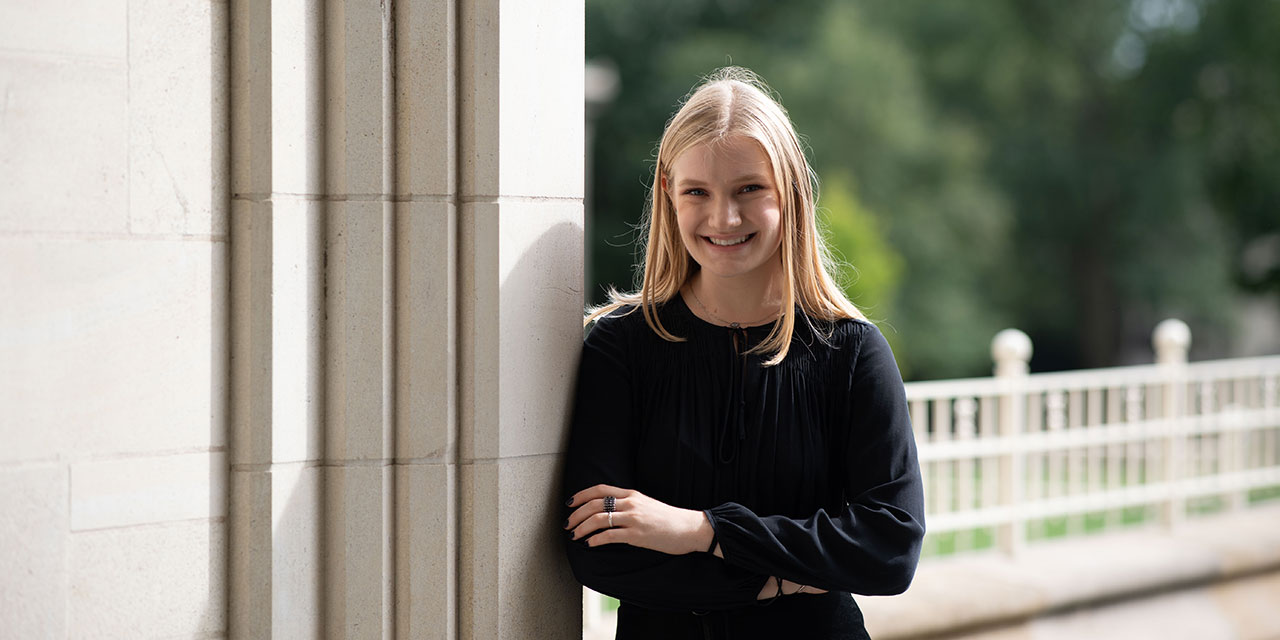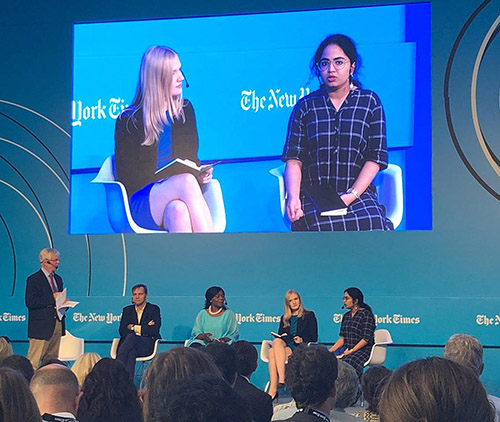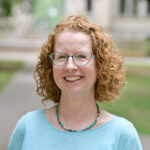
Wooster Senior Shines on Global Stage

WOOSTER, Ohio – There were articulate, well-reasoned and -researched, and passionate discussions on stage at the Athens Democracy Forum, hosted by The New York Times Sept. 15-18. Most of the commentary was contributed by high-ranking government officials, education and non-profit leaders, or award-winning journalists, but a select few were student attendees, including Sabrina Harris who more than held her own on one panel while representing The College of Wooster on a global stage.

Wooster senior Sabrina Harris (left on the video board) was a panelist at a New York Times-sponsored global conference on democracy.
The Athens Democracy Forum, hosted at the Zappeion Exhibition Hall in the heart of Greece’s capital, is in its sixth year as a conference that brings together international experts across a variety of organizations, plus 21 undergraduate students from around the world, and they work together “to identify concrete actions for governments, businesses, and citizens to take to preserve a free society.” This year’s theme was “Democracy in Danger: Solutions for a Changing World.”
Harris, a senior political science major with a concentration on international relations and Spanish minor, earned the prestigious invitation after being nominated as Wooster’s representative of the Global Liberal Arts Alliance – an “astounding distinction” in its own right, remarked the native of Highland Park, Ill. – then writing three essays as part of an application that ultimately led to her selection by the GLAA review committee. She became the first Wooster student to attend.
The one-week trip started with “labor intensive” workshops for the forum, as Harris and her fellow undergrads worked in small groups (with four advisors) examining four of the United Nations stated sustainable development goals – reduced inequalities, climate action, good health and well being, and quality education. They wrote background guides and did mock presentations, and then during the conference, took down copious notes, ideas, and solutions, which will be turned into white papers and published by the Times at a later date.
“Mostly, we were kind of left to our own devices, which I really appreciated because that let the discussion be a lot more relevant,” Harris said of the prep work. “It was like the best part of every class I’ve ever had because everybody there was so intelligent, had clearly done their research, and was really passionate about what we were working on. That, naturally, led to very fruitful discussions, projects, presentations.”
Based on Harris’ performance the first few days, she was chosen for “an amazing opportunity,” serving as one of four on the “Bridging the Generational Gap” panel, alongside Radek Sikorski, Poland’s minister of foreign affairs from 2007-14, Thuli Madonsela, who played a crucial role in drafting the constitution of South Africa and was one of Time magazine’s 100 most influential people in the world in 2014, and fellow student Ragini Rao Munjuri of Flame University in India.
The panel, a discussion on the perception that today’s youth are not engaging in governance throughout the world, perfectly matched up with one of Harris’ interests. She disputed that narrative, saying today’s youth are engaging in politics, just in a different way than prior generations due primarily to changes in technology. Also, she effectively argued that her generation faces many pressing issues, such as climate change, gender dynamics, and political rights for marginalized groups, and offered the idea that American youth with centrist political views have no party to belong to.
Harris exuded a level of confidence on stage rarely seen from a 21-year old, especially one in front of an audience of 300 or so dignified global stakeholders. Though she was “very much freaking out on the inside,” she credited her comfort to her experiences at Wooster with Model UN (she is currently serving as president of the student organization) and “the discussion structure of classes here, which has been very effective in building up those public speaking skills.”
Harris, who did sneak in some sightseeing to the Acropolis of Athens, also noted that the experiences she has received from the political science department prepared her well for the spotlight. She was a sophomore research assistant to professor Kent Kille and is now knee deep into a senior Independent Study on the internal dynamics of how international organizations affect the ability for women to attain leadership positions. That background helped her land a summer internship at a Washington, D.C., liaison office of UN Secretariat, and she also studied abroad one semester in Switzerland.
“My goal was to integrate the theoretical and applied knowledge I’ve learned during my time at Wooster. I wanted to illustrate that the things we are exposed to in the classroom are relevant beyond academia and have immediate consequences within our world,” she said of her time on the panel. “I’m so immensely grateful to the faculty here, especially my advisor, Dr. Kille, for having pushed me to continuously work at a higher level that I ever thought possible. Wooster’s education is truly transformative, and has taught me the value of thinking beyond myself in working to create change.”
Posted in News on October 3, 2018.
Related Posts
Related Areas of Study
Political Science
The study of power, with concentrations in U.S. politics, international relations, political theory and comparative politics.
Major Minor

